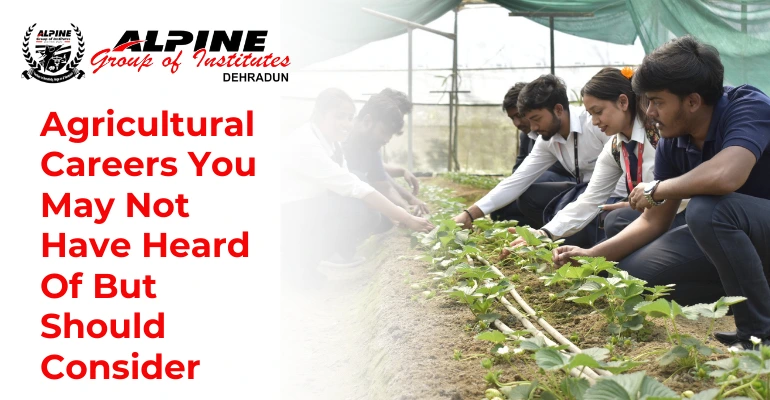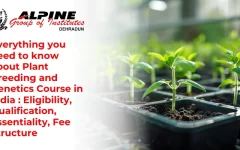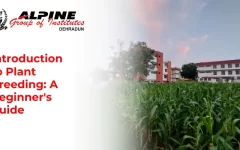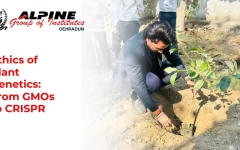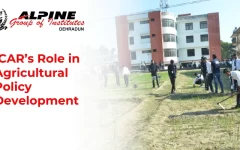Agricultural Careers You May Not Have Heard Of But Should Consider
2024-12-16 7:54Agricultural Careers You May Not Have Heard Of But Should Consider
When most people think of careers in agriculture, they often envision farmers working the land or ranchers raising livestock. While these traditional roles are undoubtedly essential to the agricultural industry, there is a wide range of exciting, innovative, and lesser-known career opportunities that can also make a big impact on the future of food production, sustainability, and rural development.
In today’s rapidly evolving agricultural landscape, new technologies, business models, and global challenges are creating a demand for specialized expertise in fields like data science, economics, and food safety. These career paths not only play a crucial role in improving the efficiency and sustainability of agriculture but also offer diverse and rewarding opportunities for students with different skill sets and interests.
1. Agricultural Economist
While economists are often associated with finance or business, agricultural economists apply economic principles to agriculture. They analyze the economic aspects of farming, food production, and natural resource management to help shape policy decisions, improve farm efficiency, and promote sustainability.
What they do:
- Analyze trends in crop prices, supply chains, and global trade to forecast the economic impact of agricultural activities.
- Conduct cost-benefit analyses for various farming practices and technologies.
- Work with governments, NGOs, and agricultural organizations to develop policies that support food security, rural development, and environmental sustainability.
- Research topics such as land use, agricultural subsidies, and international trade agreements.
Why consider it:
If you enjoy working with numbers, statistics, and economic modeling, agricultural economics is a great fit. With the increasing globalization of agriculture, agricultural economists are critical for advising policymakers and farmers on how to navigate challenges like climate change, trade tariffs, and market volatility.
Potential Careers:
Agricultural Policy Analyst, Rural Development Specialist, Farm Management Consultant, International Trade Expert.
2. Agricultural Data Scientist
In the age of precision agriculture, data is king. Agricultural data scientists combine expertise in data analysis, machine learning, and agriculture to develop solutions that enhance farming efficiency and sustainability. From sensor data on soil moisture to weather patterns, agricultural data scientists use data to optimize everything from crop yields to resource use.
What they do:
- Develop algorithms and data models to predict crop performance, pest outbreaks, or water usage.
- Analyze data from sensors, drones, and satellites to monitor farm conditions in real time.
- Work with agribusinesses to create data-driven tools for precision farming, which improves the accuracy of planting, fertilization, and irrigation.
- Help farmers make better decisions using data analytics to increase productivity while reducing waste and environmental impact.
Why consider it:
If you have a passion for technology and data, this career combines your analytical skills with the real-world impact of agriculture. Agricultural data scientists are in high demand as more farms adopt technology like IoT (Internet of Things) sensors, drones, and automated systems.
Potential Careers:
Precision Agriculture Analyst, Data Analyst for Agriculture Tech Companies, Agricultural Technology Consultant, Machine Learning Specialist
3. Food Safety Expert
Ensuring that the food we eat is safe, nutritious, and free from contaminants is a vital part of the agricultural process. Food safety experts focus on the production, handling, and distribution of food to prevent foodborne illnesses and ensure that food products meet regulatory standards.
What they do:
- Monitor food production processes to ensure compliance with health and safety regulations.
- Develop and implement safety protocols to prevent contamination during the stages of farming, processing, packaging, and transportation.
- Conduct inspections and audits of food production facilities, farms, and processing plants.
- Work with regulatory agencies (like the FDA and USDA) to ensure that food safety laws and standards are upheld.
Why consider it:
With the global food supply chain becoming more complex, the role of food safety experts has never been more important. This career offers the opportunity to protect public health while contributing to a critical area of agriculture. Food safety experts are in demand across the world, working with food producers, processors, and retailers.
Potential Careers:
Food Safety Auditor, Quality Control Manager, Regulatory Affairs Specialist, Food Safety Consultant
4. Agricultural Extension Officer
An Agricultural Extension Officer works at the intersection of education and agriculture. These professionals act as intermediaries between farmers and agricultural researchers, helping farmers apply new agricultural techniques and technologies to improve productivity and sustainability.
What they do:
- Provide farmers with the latest agricultural research, advice, and training to improve crop yields, pest management, and environmental practices.
- Conduct workshops, field visits, and community outreach programs to educate farmers on best practices in sustainable agriculture.
- Help farmers adopt innovative techniques such as organic farming, water conservation methods, and integrated pest management.
Why consider it:
If you enjoy working with people and have a passion for rural development and education, agricultural extension could be a fulfilling career. Extension officers play a vital role in ensuring that farmers have the resources and knowledge they need to succeed, especially in developing countries.
Potential Careers:
Extension Officer, Agricultural Educator, Rural Development Specialist, Community Outreach Coordinator.
5. Crop Biotechnologist
The field of crop biotechnology focuses on using scientific methods to modify plants and crops to improve their yield, pest resistance, and nutritional content. Crop biotechnologists use genetic engineering, molecular biology, and advanced laboratory techniques to create genetically modified organisms (GMOs) that can help meet the food demands of a growing global population.
What they do:
- Research and develop genetically modified crops that are resistant to diseases, pests, or extreme weather conditions.
- Work with seed companies and agricultural firms to create more productive and sustainable crops.
- Study the impact of biotechnology on ecosystems and food systems to ensure safety and sustainability.
- Stay up to date with regulatory and ethical debates surrounding GMOs.
Why consider it:
If you have a strong background in biology or genetics and are passionate about solving global food security challenges, this career allows you to be at the forefront of agricultural innovation. Crop biotechnology is a rapidly growing field with the potential to revolutionize farming practices and improve food availability worldwide.
Potential Careers:
Geneticist, Molecular Biologist, Biotechnology Researcher, Plant Breeder
6. Agricultural Supply Chain Manager
The journey of food from farm to table is complex, involving transportation, storage, packaging, and distribution. Agricultural supply chain managers oversee these processes to ensure that products are efficiently transported from farms to markets, minimizing waste and maximizing quality.
What they do:
- Coordinate logistics and supply chain operations to ensure timely delivery of agricultural products.
- Optimize storage, transportation, and inventory management practices to reduce food spoilage and waste.
- Work with farmers, distributors, retailers, and food processors to streamline operations and improve efficiency.
- Manage the flow of goods, ensuring that crops and livestock are properly stored, transported, and distributed according to regulations.
Why consider it:
If you’re interested in the business side of agriculture but want to focus on efficiency and sustainability, supply chain management is a perfect fit. Agricultural supply chain managers help reduce the environmental footprint of farming by minimizing waste and ensuring that food reaches consumers in the best possible condition.
Potential Careers:
Logistics Coordinator, Supply Chain Analyst, Operations Manager, Sustainability Specialist
7. Agritourism Manager
As more people seek to connect with the origins of their food, agritourism has become a booming industry. Agritourism combines farming with tourism, offering experiences like farm tours, pick-your-own produce, and on-site farm stays.
What they do:
- Develop and manage agritourism programs that attract visitors to farms and ranches.
- Organize events, educational activities, and tours that promote agriculture and rural life.
- Help farmers diversify their income by creating unique, hands-on experiences for tourists.
- Market agritourism destinations through social media, websites, and partnerships with travel agencies.
Why consider it:
If you have a passion for farming and enjoy hospitality, agritourism offers an exciting and creative way to blend agriculture with tourism. It’s an opportunity to educate the public about agriculture while providing a new revenue stream for farmers.
Potential Careers:
Agritourism Coordinator, Event Planner, Farm Manager, Marketing Director
Conclusion: Thinking Outside the Box in Agriculture
Agriculture is much more than planting crops and raising animals. It’s a dynamic, diverse field that touches nearly every aspect of society, from business and technology to education and sustainability. As the industry continues to evolve, new and exciting career paths are emerging, offering students opportunities to explore innovative roles that combine passion with purpose.
So, if you’re passionate about agriculture but don’t see yourself on a traditional farm, consider some of these lesser-known careers. Whether you’re into data, policy, safety, or even tourism, there’s an agricultural career waiting for you. By thinking outside the box, you can find a niche that aligns with your skills, interests, and desire to make a difference in the world.


